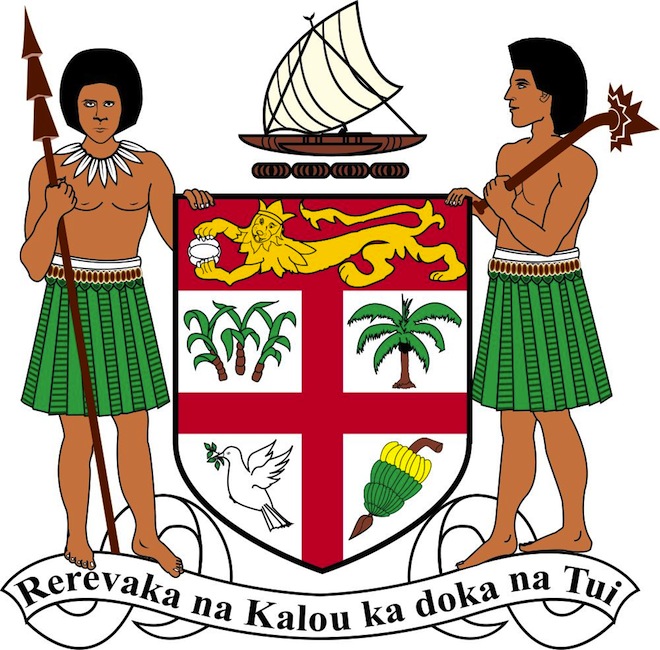
Fijian coat of arms. The motto translates to “Fear God and honour the Queen” (Wiki Commons/Simi Tukidia)
My strange fascination with cannibalism began while I was studying history in graduate school. In a book whose title I have since forgotten (which might indicate why I quit grad school altogether), I read that Nelson Rockefeller’s son Michael Rockefeller disappeared when he was 23 years old and that he was possibly cannibalized in Melanesia. At the time, I didn’t know which came as a bigger surprise: that the young Rockefeller was most likely devoured by other human beings or the fact that it happened in 1961, which still seems relatively recent for people to have been eating each other.
Of course, most people in so-called “civilized” society are under the impression that cannibalism is a thing of the past. And I don’t mean “cannibalism” metaphorically or as some kind of fetishistic anomaly. I mean it as a religious practice in which one individual literally consumes another as part of a ritual to ingest an enemy’s knowledge, courage, and power.
Yet while cannibalism is a full-blown taboo in the Western Hemisphere, it’s also been a standard practice in another part of the world for generations. The area where Rockefeller disappeared lies just south of the equator and west of the international dateline, a subregion of Oceania that’s also home to New Guinea, the Solomon Islands, and Fiji, aka the “Cannibal Isles.” But because cannibals haven’t kept written records of their practice, it’s almost impossible to find out when it stopped, if at all.
For instance, the Korowai tribe in Papua New Guinea supposedly still practices cannibalism today, which prompted a 60 Minutes crew to investigate. After the show aired in 2006, however, people claimed that it was all a hoax in an effort to drum up tourism. Yet what kind of a weirdo would go somewhere specifically because there might be cannibalism? As it turns out, I would.
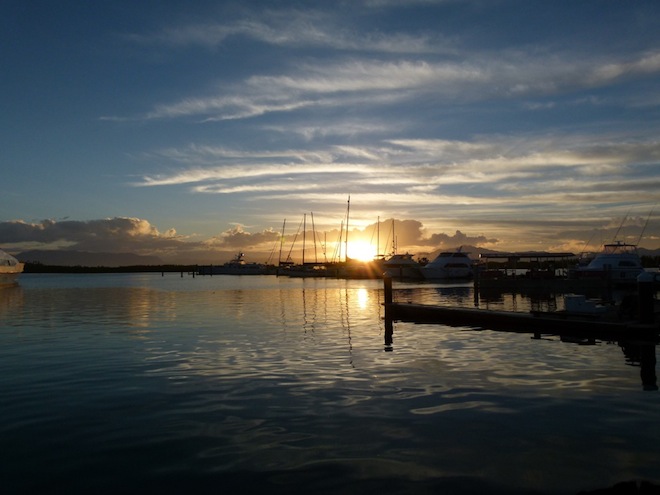
Port Denarau in Viti Levu (Photo: Tanja M. Laden)
When I recently found myself on a romance-themed press trip to Fiji, cannibalism was the first thing that came to mind. Truthfully, I don’t usually write about romance: I tend to gravitate toward the offbeat, lesser-known aspects of culture. Rather than covering UNESCO World Heritage Sites in Croatia, I wrote about the Museum of Broken Relationships in Zagreb. In lieu of of documenting the Iceland Food and Fun Festival, I canvassed the Icelandic Phallological Museum and took an afternoon crash-course at the Icelandic Elf School. And instead of covering the well-trodden literary landscape of San Francisco, I paid a visit to the Antique Vibrator Museum. So during my time in Fiji, while my colleagues were researching romantic getaways, destination weddings, and honeymoons, I was interviewing a Bouma tribesman and elder storyteller about his cannibal ancestors.
I suppose I should have felt guilty that I wasn’t writing about the romantic topics the nice people at Tourism Fiji hoped I’d cover when they sponsored my entire trip. But one look at my list of published stories and they’d have seen that romance wasn’t exactly my beat. Even so, I was feeling a bit awkward about how I’d tactfully pursue the sensitive topic of cannibalism while I was supposed to be focusing on boutique hotels, beach-side weddings, and cloying cocktails. But the ironic truth of the matter was simply that my heart wasn’t into writing about anything sentimental. After all, to most people, Fiji is still very much an unknown part of the world, and I wanted to write about something equally unfamiliar.
I finally resolved to write about cannibalism once I learned that we’d be visiting the island where the last act of cannibalism was recorded: Taveuni. Also called the “Garden Isle,” Taveuni is the third largest island in Fiji, with indigenous people comprising about 75% of the population. If anywhere, this would be the place where someone could tell me for certain if and when cannibalism actually ceased in Fiji.
Immediately after our group arrived in Taveuni, I told our driver Babu that I wanted to talk to people about cannibalism. As the rest of the journalists departed to have banana leaf-wrapped massages, Babu took me to interview Josef Rapuga, a 52-year-old tribesman of the Bouma waterfalls and part of the chief’s clan in the Mau community of Taveuni. Per local custom, I first needed to buy two bundles of kava root at $20 each, plus a sarong and a pack of Benson & Hedges Ultra-Lights to present as gifts to the 55-year-old Mau chief, Joe Turaqacati, before I asked the chief whether I could “borrow” Rapuga for an interview. After a small, slightly awkward ceremony in which the chief’s tribal council accepted my gifts, I was officially permitted to ask Rapuga, the clan’s official storyteller, anything I wanted to know about cannibalism, with the help of a translator.
Back at the picturesque Taveuni Palms resort where my group was staying, Rapuga and I sat down to discuss how cannibalism first became a ritualized practice in Fiji when European settlers arrived in the 19th century. He told me Fijians would eat people from other “races” to protect their property and as a form of revenge. When hunting down and eating their enemies, locals used a stone axe (matau vatu) and a spear (moto), along with an eye-gauger (totokia) and a sea (pronounced say-ah), which was like a brain-smasher. Then they’d eat their victims with a special cannibal fork called an ai cula ni bokola.
After Fijians killed their enemy, they’d drink the blood in order to become more powerful, because, as Rapuga noted, “the blood runs through the entire body.” The corpse would then be divided into portions, with the chief eating the heart and brain because everyone believed he’d literally “absorb” his enemy’s knowledge and courage. Next, a village priest would perform a ritual to one of the gods and the tribe would gather for a big celebration under the moonlight, dancing with their spears around a bonfire while the feast was cooking.
Josefo Rapuga, tribesman of the Bouma waterfalls and member of the chief’s tribal council in the Mau community of Taveuni (Photo: Tanja M. Laden)
Since the chief said that any question was OK, I asked Rapuga if he knew how humans tasted, and whether cannibals would serve the meat with any side dishes like vegetables. He said humans tasted like pork but sweeter, and that they’d cook the meat in an earth oven and serve it with breadfruit and yams.
When I questioned how he knew all this, Rapuga said nobody told him, but that he had somehow known it all along. He claimed that the last person to eat another human being in his family was his great-grandfather, and that Rapuga himself received all his knowledge about cannibalism almost immediately after his own father died in 1998, without anyone ever telling him anything directly.
According to Rapuga, cannibalism officially stopped in Fiji in 1844, when a man from Tonga waged war against the Bouma clan in a place called Kai lekutu, or “place of the forest people,” in what is now Bouma National Heritage Park. After the man was killed, the first thing the tribesmen did was take out his heart, which they took to a hilly area they named Tavuki, the regional word for “spit,” because that’s where they’d roast the meat on a spit.
Cannibal forks on display inside a hotel room at the Westin Denarau Island Resort (Photo: Tanja M. Laden)
When Christian missionaries arrived in Fiji soon after, cannibalism supposedly ended, but not before a Methodist missionary from England named Reverend Thomas Baker was killed and eaten in 1867 in the village of Nabutautau on Fiji’s largest island of Viti Levu. After Baker’s death, local Fijians noticed that their soil suddenly became infertile and all their crops died, so they began to believe other Christian missionaries who warned the cannibals that they were condemned because of their past. This led Fijians to make a series of three official apologies to Baker’s descendants, the most recent one in 2003. After that, Rapuga explained, “Their soil became fertile again, which to them, confirmed the idea that they were cursed.”
Rapuga said that the last act of cannibalism in Fiji was in 1844, but acknowledged Baker’s murder, which happened more than two decades later in 1867. He also told me his great-grandfather participated in cannibalism, but it’s highly unlikely his relative lived so long ago. Finally, Rapuga said cannibalism started with European settlers and ended with missionaries, yet both groups arrived in Fiji around the same time during the 19th century, which sounds like cannibalism ended almost before it began. But rather than belabor the dates, I asked Rapuga whether he thought it was possible that cannibalism was still happening in Fiji today. He just smiled and said that he believes it’s finished. “Our people are going to church,” he said, and that was the end of our interview.
Left: Ratu Tanoa Visawaqa, King of Bau 1829-1832 and 1837-1852 (Source: David Rumsey Map Collection/Wiki Commons) Right: Fijian mountain warrior Kai Colo, 1870s (Source: F.H. Dufty/Wiki Commons)
By nature of the practice itself, cannibalism in Fiji was rarely recorded, so how is it possible that the last act of cannibalism was? Fiji has 1166 tribes and 332 islands (less than half of which are “permanently inhabited”), so how do we really know if it still isn’t happening in the interior regions and other places where westerners don’t honeymoon? The truth is, we don’t.
Discouraged over my dead-end interview with Rapuga (and a little chastened over missing a banana leaf-wrapped massage), I believed my cannibalism story had reached a dead-end, too. But then shortly thereafter, in one of those cosmic coincidences that can only be described as serendipity, I met Katie Selachii* during a snorkeling expedition on a tiny island between Viti Levu and the small island of Yasawa.
Originally from the United States, Selachii has been living in Fiji for nearly 20 years, operating her own local business renting diving equipment to tourists. We immediately hit it off, and she seemed intelligent, articulate, and very down-to-earth. When she asked me what I was doing in Fiji, I told her that I was trying to write a story about cannibalism. Without missing a beat she asked, “Did you know that cannibalism is still happening in Fiji today?” Then she handed me her business card and told me to call her.
So once I returned to Los Angeles, I did.
“Basically, I do have a good friend here who has eaten someone,” Selachii told me over the phone from her office in Fiji. “He kind of told me the whole story.”
Selachii said that as long as she was able to speak under the condition of anonymity, she was happy to talk to me. Of course, it occurred to me that what she was about to relate to me might not be true, but my gut told me not to doubt her sincerity. In the end, I just couldn’t believe she’d lie about something so detailed, and as it turned out, relatively in keeping with what Rapuga already told me about his own relatives.
When Selachii first asked me to call her, I realized that maybe this woman needed to tell me her story almost as much as I needed to hear it, so I let her speak.
She began telling me about her her friend Marcus*, a 41-year-old native Fijian who cannibalized someone 11 years ago. Selachii said Marcus and Dinesh*, a man from another tribe, were fighting over the same woman when the feud escalated and Dinesh attacked Marcus in the middle of the night — threatening to kill him and eat his entire family. Marcus believed his enemy would actually follow through with his threats, so rather than allowing himself to become a victim, Marcus decided to come up with a plan to kill Dinesh and eat him first.
“He’s one of the most traditional Fijians I’ve ever met,” Selachii described Marcus, “So it doesn’t surprise me that out of all the people I’ve met here, he would be the one to be a cannibal.”
Selachii said Marcus knew when Dinesh would go out fishing in an outrigger canoe, and because they were in a fairly isolated area, Marcus was able to murder his rival without anyone around. He used a club to kill Dinesh, then brought him to a remote beach and cut him up into smaller pieces before Marcus burned the body of his enemy and ate him.
“He said that his vu were with him, guiding him the entire time,” Selachii said. “The vu are your ancestral spirits: all of your relatives that have already passed. They are always there, watching you and guiding you.”
While Selachii said nearly all her Fijian friends believe in vu, Marcus maintained that he could actually see his on the beach while he was getting ready to eat his victim. In fact, his vu provided detailed instructions on how to eviscerate and consume his nemesis.
Selachii asked Marcus whether he knew of other cases of cannibalism, and he admitted that it doesn’t occur every day, but he knows for sure that it’s still happening, especially in secluded areas of Fiji like the relatively uninhabited island where he lived.
Once Marcus killed and ate Dinesh, Selachii said her friend couldn’t sleep for years because he was constantly haunted by visions of what he did. Eventually, Marcus started drinking heavily and even went through a suicidal phase. Since then, it’s become easier for him, but not much.
“It basically fucked him up for the rest of his life. He has to live with it every day,” Selachii said. “But it’s this weird duality, because one part of him, the western side, is totally messed up about it and is horrified that he did this. Then there is this other side — and I can’t explain it — that doesn’t have remorse. Like it’s this sort of ancestral idea of, ‘We’re supposed to do this. This is who we are. This is a part of our culture.'”
By all appearances, cannibalism has always had a highly spiritual purpose within the context of an intensely personal ritual between a warrior and his victim, which is why it’s historically undocumented. Yet cannibalism remains deeply ingrained in Fijian local communities as part of its cultural heritage and narrative history. At the Nadi International Airport in Fiji, for instance, stores actually sell replicas of cannibals forks and cute little “cannibal man” souvenirs, so it doesn’t seem as though Fijians are exactly ashamed of their heritage. In fact, it looks like they’re proud of it.
Yet while native Fijians are still negotiating the reality of their own cannibal past through their ancestors, both dead and alive, Christian missionaries forever changed Fijians’ concept of revenge — shifting the paradigm to forgiving their enemies instead of eating them. But the missionaries also introduced Fijians to the idea of guilt, which doesn’t appear to have stopped cannibalism from happening in Fiji — it just makes it less bearable for the descendants of cannibals to accept today.
As Selachii and I wrapped up our conversation over the phone, I thought about the incredible story she had just told me. What struck me most about my reaction was the lack of one. I wasn’t as stunned as I felt I should have been. I questioned my indifference, working up a slight neurosis over my nonplussed attitude upon learning that cannibalism is still happening. But then, wasn’t this the answer I was seeking all along? Perhaps, just like Rapuga, I “knew” cannibalism never really ended without having anyone tell me, and Selachii’s story just confirmed it. Maybe an unexplained part of me was always aware that cannibalism is still a reality, and I simply needed proof. In the end, it’s possible this unusual piece of knowledge came from my own vu, just like the ones who taught Marcus how to eat his enemy.
* names have been changed per request

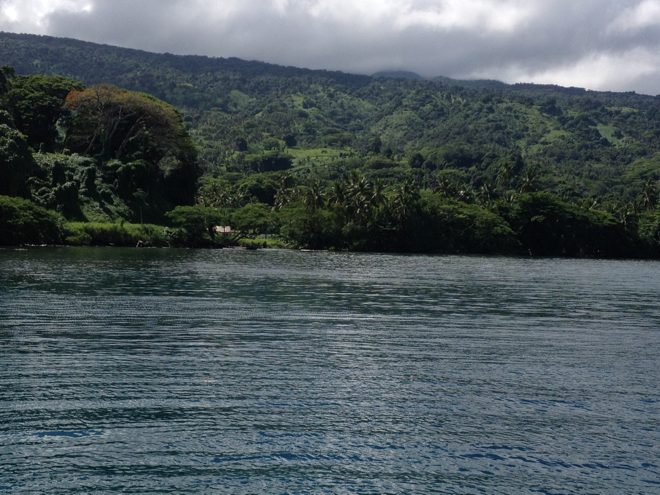

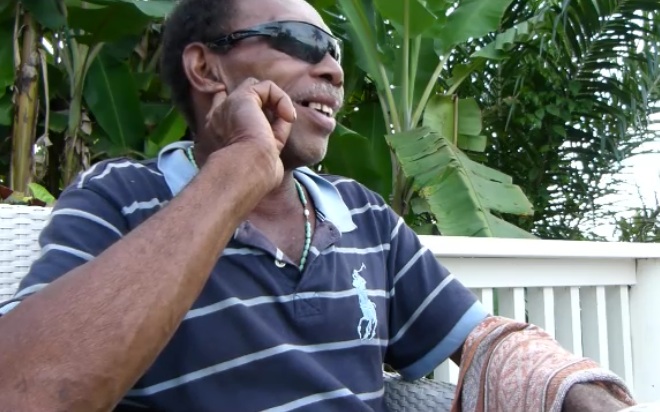
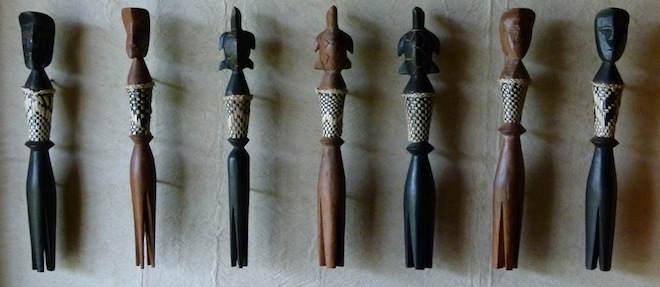
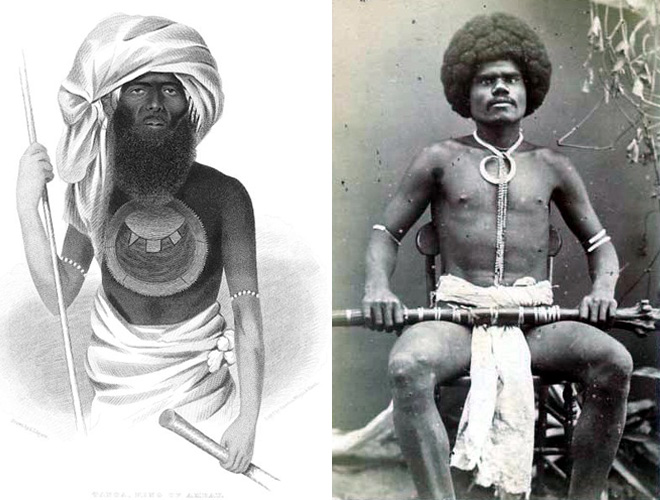
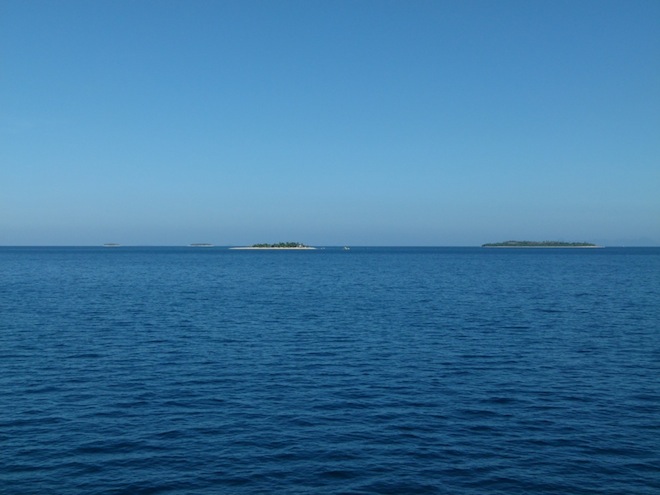

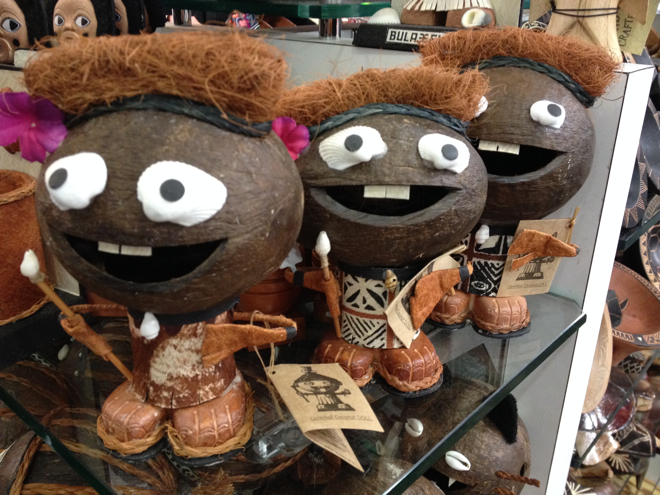





it is nice to read along your story mr dave
Very cool. Thanks for sharing
thank you mr. dave. we would love to have you over for dinner in your next visit……
Do I need to be suspicious of your generous offer!?
Your article came off as condescending and devoid of any ounce of truth or credibility. At least do some extensive research on the topic before you boldly make accusations about something you clearly have know real knowledge about. You should have stuck to writing about romantic trips like your friends instead of indulging in this load of BS and feeding your fictitious fantasies about our beautiful Island based on questionable testimonies. Please refrain from trying to write about our people in Oceania, it’s the 21st century, we can write about ourselves too without the likes of you coming in with your “I’m civil and you’re not” mentality and proliferating misrepresenting views of us to the world.
Oh and btw, just because we don’t have our history down in writing doesn’t mean we DON’T KNOW OUR HISTORY. We practice oral traditions that are vessels for transferring our history down to our posterity. We have been living in our land for more than 3000 years with our own form of civilization and indirectly branding us as not so civil speaks volume about your pretentious limited knowledge of who we are.
uh … duh. welcome to the world, Capt. Obvious.
Oh good, your one friend basically told you about her other one friend who kind of told her a whole story one time. Thanks for your thorough dedication to legitimate, unbiased understanding of an entire culture of people. Really well done. *slow clap*
my comment was of course in response to your “generous offer” reply to Bau Jr. – NOT to the article in general
Thank you Mr. Dave, in your next visit come and see me..I will tell you the full story and lastly eat you. lol..
A few points:
For all her research into Fijian culture Tanja clearly has no sense of their humour. Rapuga’s ‘testimony’ – and for that matter Selachii’s story too – sound just like the camp fire fable locals tell tourists, along with ‘sharks are vegetarians’ and ‘humans taste like pork’. I have heard these stories spun to tourists since I was a child sitting on the back of my dad’s outboard fishing boat, and they are always spoken in jest. Let us give thanks Tanja’s only calling is pseudo-investigative journalism and love stories – God forbid she be thrust into a consequential profession like political commentary or, I don’t know simply reporting actual facts; she may need to first of all learn how to do her job, then develop a sense of humour.
^I couldn’t agree more with Save (comment above) “Please refrain from trying to write about our people in Oceania, it’s the 21st century, we can write about ourselves too without the likes of you coming in with your “I’m civil and you’re not” mentality and proliferating misrepresenting views of us to the world.” Nailed it Save. Vinaka sara valevu.
Can’t imagine Fiji Tourism would be too impressed that she went rouge at their expense either. Kind of rude that she is selected for an all expense paid trip to one of the most beautiful places on earth, entrusted with the important task of supporting the industry on which Fiji (a third world country country striving to thrive) survives with her writing, and turns around to publish a injurious story based on a camp-fire joke and a kai-vulagi woman’s hear-say. Who by the way could probably use a dose of humour herself.
Man, lucky we have this iTaukei expert here to educate us on our culture, history, and people.
P.S – Dinesh from Taveuni. Lmao! Perhaps she wasn’t hoping to sound credible at all.
Please do us all a favour Tanja; don’t come back.
Is there any hard evidence that shows cannibalism in fiji? It was mostly according to the European Settlers that Fiji came to be known as the Cannibal Island. This European settlers crabbed land from Natives all around the world causing chaos where ever they set foot. I haven’t seen any photos of people eating human flesh in fiji and by the way, basic cameras exited then. This was done to make the Fijian people inferior. They refer to Natives around the world as savages. As a Fijian, the topic of cannibalism in Fiji is something i really disagree with and it pains me how some people think the opposite. All they (European Settlers) did was take things from the Natives. They bribed my Ancestors with pistol for acres and acres of land. A fucking pistol!!!!. I know because that was done to my Ancestors from BA region. I think this topic of Cannibalism in Fiji needs to be looked at again and facts…actual facts should be presented and just some folk. who knows, maybe those folks were used just to eat food. we need to keep asking questions and dont believe anything without the actual fact.
Many Thanks.
Your article reaks of uninformed, insensitive, supremicist, attention seeking nonsense typical of an individual who doesnt give a damn about the subjects they are talking about. All you care about is a controvercial headline that you can get get attention for.
You come off as a condescending ignorant that neither knows nor cares about the subject they are talking about as long as they get kudos.
You were welcomed in the country as a friend and yet proceeded to seek out and highlight unproven testimonies tht supported your preconceived assumtions/controvercial ideas.
That is just self serving nonsense.
Shameful.
This article is a clear example of why Tourism Fiji needs to stop funding these junkets. Writers of dubious quality and distinction, writing for unknown publications (in this case, a blog I’ve never come across before) are handed out all-expense paid for trips–and can’t even be bothered to follow through on what they’ve been asked to produce. Where is the accountability? Tourism Fiji is badly managed and spends without any thought given to value or quality.
In this case, they’ve paid for this author to dabble in amateur anthropology and fashion his theories on questionable accounts, hearsay, and garbage that anyone from Fiji knows are ‘tall-tales’ fed to gullible tourists.
So, Marcus ate Dinesh? More likely, they fashioned this ridiculous tale over a night of sharing kava and B&H cigarettes, to peddle to this ‘writer’.
Tanja is gullible!
The chief should have told her correct facts like… It was the Fijians who first planted Bisikete…. Lol
In the villages there would be an elder who would sit kids around and tell them stories as such like Marcus and Dinesh and that was like movies for kids in the 70s and 80s……kids will be scarring one another out of what they hear. And Mr Dave reminds me of all those kids …..lol…..
Claims that cannibalism is still in practice, or in any way celebrated, by the people of Fiji is unsupported by fact. We regret that a guest of Tourism Fiji’s chose to focus on unverified storytelling and apologize to the people of Fiji for any negative impact felt as a result of this unfortunate misrepresentation.
Gosh I laughed so much reading this….. As If I could see the storyteller laughing to himself n thinking I’m gonna get this fella ….. You obviously don’t understand Fijians….. They’ve got you alright….. N what’s this all expenses paid trip ???
Wow. what are great story. Next time you might wanna save yourself a trip to the “Cannibal Islands” and investigate in your home town. As far as I know, cannibalism is happening in the US (a friend I met by accident told me she knew a serial killer who has been eating his victims’ flesh and drinking their blood for over 20 years).
Why come down here, when there’s more psychos on your side of the world?
LOL JUST LOL!!!
There is absolutely no doubt cannibalism carries on today, mainly in remote territories where it’s existed for centuries and where there is no real reason why things would have changed.
But you are wrong to think there is anything “spiritual” about it. Quite the opposite, human spirituality can only come into being when such practices (cannibalism, human sacrifice, head-hunting) have been dropped. Hence, the depression Marcus had to live with after his action. It’s not “christian-induced” guilt he felt, only his own conscience, his own humanity. When these can develop in a human being – christian or not, or even atheist – he cannot regress to the rudimentary, archaic stage of conscience of a cannibal without literally self-destructing.
Marcus had just grown out of it. In other terms, he had become an adult.
He could only have achieved turning his back to his evolved human self and happily regress to cannibalism if he had become a psychopath ( a deranged, sick mind), but he obviously was too good a person for that. He stayed sane after his action, and that’s what brought him down.
The “vu” he saw was just a mingling of his imagination, superstition and a fascination for his ancestor’s culture. As it turned out, listening to that was a major blunder. I am sorry for him.
what year was it that Marcus eaten someone
any indian repuges in fiji is lands? unesco, unicef.,and some other social organisations why not bring them to bright land ?
it is seens that not even fiji islands,there are so many countries are below poverty lion ,still they are in stoneage culture,it is the responscibility of all devoloped countrys ,and their leaders,and all social organisations of the world ,to bringthem near to education andculture
Its a general interest topic, not a thesis. Grow up people.
Dave, I thoroughly enjoyed this article.
Emma and Dave

 you both sound delicious
you both sound delicious


I’m going to Fiji on a missions trip in July for a month!! Should I avoid any places??? Should I go to Fiji now?? Will they eat me???
Very interesting. But let’s be honest… Just about all places of the world have a history of cannibalism. But nice read. I’ll have to use that story at night for my son.lol
You are gullible Tanja! I am from Fiji and for that tourist guide to say cannibalism still exist was just pulling your strings… Read and research your facts first before implying that Fiji still has cannibalism around
I was in fiji traveling solo in the remote villages. Yes they still eat ppl. I was there for 3 months. No bullshit. And lots of black magic there that you will never experience in western countries. Stay far away from this country fiji. Bula fuckanaka
there is a lot of comment to this cannibalism thing…….cumon people its time to civilized …..no more discrimination…..let us not talk about other peoples traditional lives and give bad comments about it……you know , you might think that what you are saying is right but on the contrary you are hurting other peoples feelings….an example is this, if you have visited some place for a vacation or travelling and people on that place are friendly and kind to you……what can you say about them?….so if anyone thinks that Fiji is still practicing cannibalism, that person is discriminating the people of Fiji…..so please if you visited Fiji again try and see how people show respect to you as a visitor(vulagi dokai) and stop talking about the cannibalism thingy cuz fijian nowadays are more civilized……
Honestly? It was great to read my friend! I was doing some research on Fiji and I came across this artickle. Very nice details, thank you.
Anyone who thinks cannibalism still happens in “remote islands” in Fiji is mad and has never spent much time in Fiji. That is utter bull-shit.
As for black magic (draunikau) it is still practiced here and there (the churches condemn it on a regular basis in newspapers) One has to remember that Fiji has operated a very quick transition from the 1850s to the 21st century, so elements of “Middle Age” thinking still exist and one shouldn’t think Fijians have mental problems (a lot of people in the west believe in crap like astrology, etc…). By and large, Fijians have very little scientific culture, so the old beliefs in supernatural (lazy) explanations are still there to fill the gaps, but it will vanish in a few generations time.
We can tell from the gross inconsistencies of that Fijian story teller how reliable your information is…
Fijians are wonderful people and their history, even if “dark”, doesn’t quite beat the worst atrocities commited by other nations of the world in the 20th century…
Michael Rockefeller disappeared in Papua New Guinea not Fiji. Funny how you tied that into your article to make your bullshit point
We all know that cannibalism still exists, the so called elite and other satanists practice it on a regular basis, please do your own research.’ vu’ is just another word for demon. Cannibals are demon possessed. Please tell your Fijian friend that we can all find forgiveness through our Lord and Savior JESUS CHRIST. There’s no real peace and forgiveness without JESUS. If you die in your sins you will go to hell.
What a load of C R A P…
This is utterly ridiculous and a load of unintelligent rubbish. If you did your research then you would have known that Fijian people are some of the most devious pranksters in the face of the earth. Your article was based on an unreliable source and it was insensitive and presumptuous of you to bring up something that a race of friendly people ain’t proud of. Did you even go to college and learn that you need authentic evidence for your writing. Sad. Just Sad.
If you are so interested in this go to Africa where it is still widely practiced against albinos and pygmies, as well as our cousins the gorillas and chimps…
It is really pathetic, how mentally disturbed people gravitate towards things that validate their ownpathology. As a healthcare professional I found it very telling that the author admitted to a fascination with cannibalism that predated the alleged reported experiences. It is also very telling that, unlike the alleged protagonist of this cannibal story, the author himself appears to have no insight shame or guilt regarding the imbecility of his own transgressions. This is highly representative of the social pathology of Americans, wherein they project their own mental disease on to the eorld at large. Unfortunately, the universe has seen it fit to endow Americans with the tools and resources to the spread this us pathology much further than it ever should.
Sorry but using Dinesh and Marcus (an Indian and European) as the ‘native Fijians’ in your story is just hilarious. Even if you are trying to hide their identity.
The only cannibals in Fiji are the ones on the rugby field putting people on slabs world wide! Sai vei au o i’o!
> This is highly representative of the social pathology of Americans, wherein they project their own mental disease on to the world at large.
If you have ever flown a homosexual flag or transgender banner in your life, you don’t get to pretend that you care about cultural imperialism. Nothing is more aggressive than the push by self-righteous Americans to legalize sin on Third World nations.
—-
As for the article:
> The government of Fiji commissioned an author who went to see the Museum of Broken Relationships and other whacky off-the-wall tall tales
> The person was told to write an article about something he did in Fiji
> He did something crazy in the remote islands where tourists don’t go
> Writes about tall tales routinely in his other articles
> Writes about a tall tale in Fiji
> People get butt hurt that the state got what it paid for
PFFFFFT